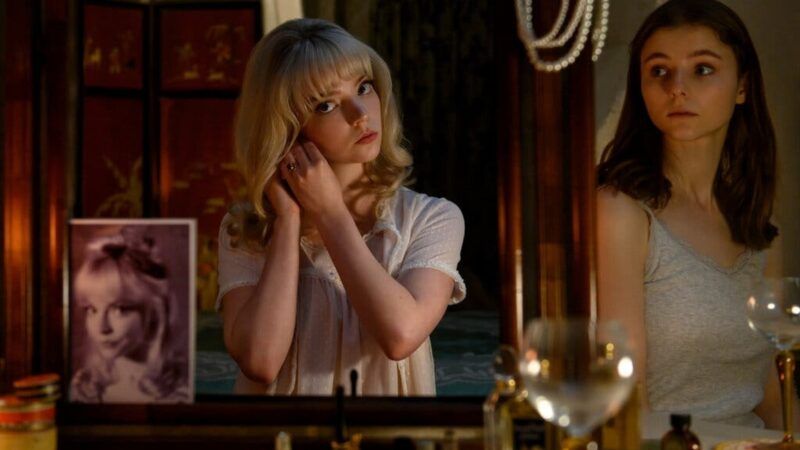Review: Last Night in Soho
Vintage creeps.

Has anything like this ever happened to you? You move to a new town—let's say it's London—and no sooner do you look around than you realize you've moved to a new decade, too, one that ended long before you were born. Judging by the vintage styles (white go-go boots, vinyl raincoats) and sounds (Cilla Black, Sandie Shaw, Petula Clark), and the big Thunderball theatre marquee overlooking a teeming nightlife thoroughfare, you are now resident in the 1960s.
Which is fine. Your mom loved that long-ago decade, God rest her troubled soul, and you find yourself telling a new acquaintance in your new town, "There's something about the sixties that speaks to me." This is clearly also true for director Edgar Wright, whose new movie, Last Night in Soho, uses Swinging London as a backdrop for a knotty tale that never quite figures out what it wants to be. Period thriller? Ghost story? Slasher flick? A bit of each, really—although the picture may be most successful as a fond recreation of London's back-in-the-day red-light district, a tatty wonderland of fancy cabarets and dashed-hope prostitutes that's depicted in all its neon glory by ace Korean cinematographer Chung Chung-hoon.
The movie is much enlivened by a strong cast. Thomasin McKenzie (Old) is Ellie, a small-town girl from Cornwall who's come to London to study fashion—dressmaking, and that sort of thing. Ellie comes from a family of seamstresses, so she's already making her own clothes. (A newspaper-print dress we see her wearing early on, at home in Cornwall, is more imaginative than anything she wows her London instructor with later on.) Although she doesn't come from money, she's so put off by her condescending dorm roommate (Synnove Karlsen) that she decides to rent a small apartment for herself from a creaky old landlady (the late Diana Rigg, in her last film role). This requires a hefty security deposit, which Ellie somehow has. To keep body and soul together in the big city, she takes a job as a bartender in a small pub. No doubt this would work out fine.
As improbabilities accumulate, Ellie—who may have inherited some sort of ESP from her mother, who knows?—begins leading a second life in her dreams, where she gets caught up in the disreputable activities of a young woman named Sandie (Anya Taylor-Joy, who has a hushed and lovely scene singing an a cappella version of "Downtown"). Sandie yearns to be a singer—or, rather, "a headliner"—at the renowned Café de Paris. Seeking assistance in realizing this ambition, she approaches a sleaze-in-a-suit named Jack (Matt Smith, of Doctor Who and The Crown), a talent manager and…something else as well.
As Ellie watches Sandie steering her life into a ditch, she tries to intervene, with disastrous results. Or so it seems.
While the story (by Wright and Krysty Wilson-Cairns) doesn't quite hang together, and this in turn blunts its effect, the director has attempted a subtle meta touch by salting his cast with period stars. Rigg, who died last year, lit up British TV in the '60s as high-kicking Emma Peel in The Avengers, and later became the first and last wife of James Bond in On Her Majesty's Secret Service. Terence Stamp, who plays a mysterious Soho codger in the movie, was Oscar-nominated for his first film performance in the 1962 Billy Budd and later featured in the 1966 Modesty Blaise, the movie version of the book John Travolta was reading in the bathroom in Pulp Fiction. And Rita Tushingham, who plays Eloise's grandmother, appeared in director Richard Lester's 1965 The Knack…and How to Get It—a key document of the Swinging London period, which was released just weeks before Lester's second Beatles movie, Help!
Wright's film is much-influenced by Roman Polanski's 1965 Repulsion—a better picture that sought to do only one thing: creep us out. But despite the arrival of various horror signifiers toward the end of this film, horror itself never really arrives.
